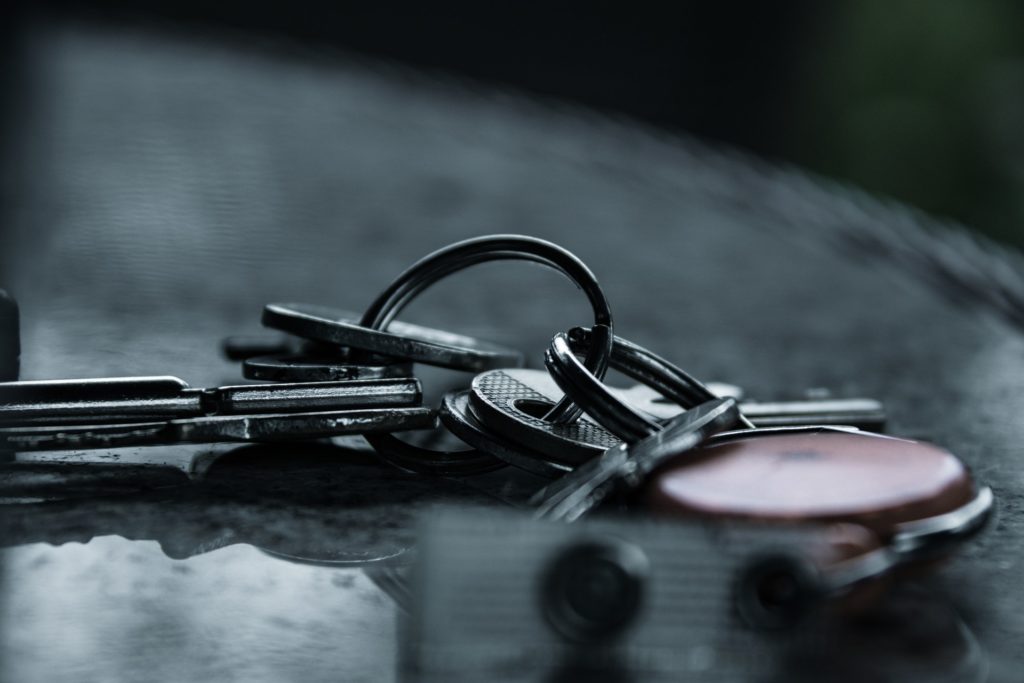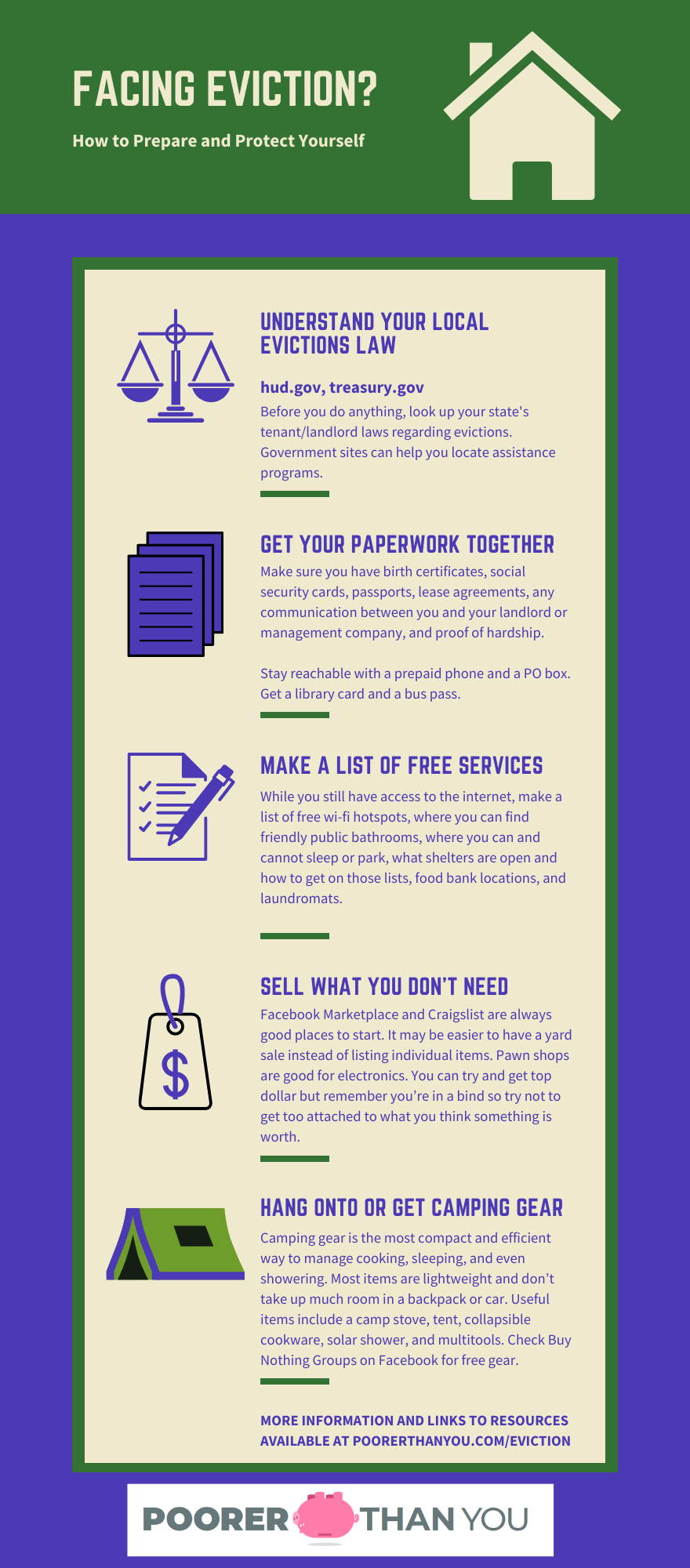
Editor’s note: The idea of getting evicted has always been scary, but the problems of the pandemic have magnified the issue and made it particularly terrifying to face. When the pandemic moratorium on evictions was coming close to disappearing entirely, Mackenzie from Lifeat23k posted an extremely helpful Twitter thread on how to prepare when facing eviction. I’ve asked Mackenzie to come here and expand out those tips, which unfortunately come from her own experience. Here’s what she has to share about what to do when you’re facing eviction:
Housing insecurity happens all the time. It can happen because of job loss, low wages, medical emergencies, divorce, and well, global pandemics. Short of being a billionaire wannabe-space-cadet, becoming homeless can happen to anyone. Let me tell you it’s a terrifying feeling coming face to face with the reality that you no longer have a safe place to call home.
If you have never been unhoused or close to it, consider yourself very lucky. Due to an unstable housing situation in my mid-20’s, my boyfriend and I were nearly homeless three times. Those experiences gave me a lot of insight into how to adjust to being unhoused. It is not a skill set I like that I have. With millions facing the same decisions I faced, I want to share what I learned to make the transition into being unhoused as realistic as possible.
I do want to be transparent about my particular circumstances. My boyfriend and I were still working during this time. Yes, people with jobs can still be unhoused. Wages haven’t increased to match the cost of living which leaves many one paycheck away from being unhoused. We had access to our 1997 Toyota Sienna as shelter. We also didn’t have kids, elderly, or disabled persons to factor into our plans.
Understand Your Local Evictions Law
Before you do anything, look up your state’s tenant/landlord laws regarding evictions. Please know this is a process. Your landlord or property manager has to file with the courts to get an eviction order. Under normal circumstances, this can take weeks. With the backlog that already exists on top of what’s about to be filed, it may take longer. Each state is different so check your state’s official website for more info. You should also check the Department of Housing and Urban Development site to help find assistance programs at either the local or federal level. Most states have millions leftover in their rental assistance funds from the American Rescue Plan and it’s available for renters and landlords. Check here for the breakdown by state.
Get Your Paperwork Together
Any assistance you apply for is going to require documentation. Make sure you have birth certificates, social security cards, passports, lease agreements, any communication between you and your landlord or management company, and proof of hardship. Keep the originals in a safe place, with a safe person, or with you. If at all possible, take pictures of everything and keep those on your phone.
Stay Reachable With a Prepaid Phone
Speaking of a phone, if you cannot keep your current plan, get yourself a prepaid phone. You need a way to be contacted and to contact assistance services. These are extremely inexpensive, can be reloaded with minutes easily, and don’t require contracts or credit checks. Tracfone is one option where you can find phones and reload cards nearly anywhere.
Get a PO Box for Mail and Packages
While you still have a residential address, get a PO Box. A box with the postal service (USPS) is usually the least expensive option, however there are plenty of mail service businesses that offer them. Per the USPS website, here is what you need to get a PO Box:
You’ll need to visit the Post Office™ where you reserved your box and bring TWO forms of acceptable U.S. identification. One form of ID must contain a photograph, the other needs to confirm your physical address. You’ll also need to bring Form 1093.
Acceptable Photo IDs:
- Valid driver’s license or state non-driver’s identification card
- Armed forces, government, university, or recognized corporate identification card
- Passport, alien registration card, or certificate of naturalization
Acceptable Non-Photo IDs:
- Current lease, mortgage, or deed of trust
- Voter or vehicle registration card
A PO Box is a good thing to have because a lot of correspondence between government agencies is sent via snail mail. You can also use a PO Box as an address for other services. You will want to set up something called “Street Addressing”—this will give you a special version of your PO Box address to use in order to receive packages from services such as FedEx and UPS. Street Addressing is a free add-on service, you just need to ask about it at the post office counter.
Keep a List of Free Services
If you have access to the internet, start noting where you have access to free services. Look for free wi-fi hotspots, where you can find friendly public bathrooms, where you can and cannot sleep or park, what shelters are open and how to get on those lists, food bank locations, and laundromats. I highly suggest watching YouTube videos about surviving while homeless or how to live in your car. These searches will have mountains of information on how to keep cool/warm during the seasons, where to find free or discounted food, safety precautions, and more. As the Boy Scouts say, be prepared.
Get a Library Card and a Bus Pass
A public library card grants you access to computers and free internet, very cheap printing, and copying services. Libraries are also places that are safe, warm/cool, and have public restrooms. Get a library card while you have a residential address because you will need to confirm your residency before you get one.
A bus pass will come in handy if you physically need to show up for meetings with case workers or to find safer places to stay.
Managing Your Stuff
Now that you have the research and paperwork portion handled, you need to start looking at your stuff because once lockouts happen you no longer have access to whatever is in the home.
Sell or Store What You Don’t Need
Start selling what you can to get extra money. You can try and get top dollar but remember you’re in a bind so try not to get too attached to what you think something is worth.
Facebook Marketplace and Craigslist are always good places to start. It may be easier to have a yard sale instead of listing individual items. Pawn Shops are good for electronics, but you definitely won’t be getting anything close to market value.
If you have the financial means, look at renting a small storage unit for the items that mean something to you. It could be things like family pictures, heirlooms, etc., or see if a person you trust can hold them for you until you get back on your feet.
Keep/Use Camping Gear
Keep any camping gear you have. Camping gear is the most compact and efficient way to manage cooking, sleeping, and even showering. Most items are lightweight and don’t take up much room in a backpack or car. Items we made sure to have were a camping stove, tent, collapsible cookware, solar shower, and multitools. If you don’t have these, Walmart has very affordable options, or check Buy Nothing Groups on Facebook for free things.
Staying Clean and Healthy
Staying clean is important because it reduces the chance of you getting sick. Hygiene while unhoused can be tricky. Those solar showers I mentioned above are a great portable item to help keep you clean. It’s a bag you fill with water and hang in the sun. It has a hose attachment that gives you access to warm/hot water to bathe.
Gyms and truck stops are other options. Gyms offer low-cost day passes with access to showers and other facilities. Truck stops also offer showers at low cost or free and you do not need to be a trucker to use them. Recreation centers generally have shower facilities and don’t require membership to use them either.
Multi-use hygiene items are a must. Dr. Bronner’s soap can be used for everything. Really. It’s even on their label. One bottle can be your shampoo, body wash, toothpaste, laundry soap, dish soap, and all-purpose cleaner. Baking soda is also great as it can be used as toothpaste, deodorant, face wash, and general cleaner and is less than $1 a box. Vacuum saver bags are perfect to keep clothes clean and dry (these ones come with a hand pump so you don’t need an actual vacuum). These bags make storing clothes in a backpack or car very easy.
What About Your Pets?
Pets add a level to this that is heartbreaking. We knew we couldn’t rehome our pets. It made finding housing even more difficult, but we just couldn’t do that. However, I 100% understand that it’s the only option for others. I hold no judgment for that having faced this decision myself.
If you won’t be able to care for your pets after being evicted, please try to rehome your animals or take them to a shelter. I know shelters are full for this reason, but they can direct you to rescues or possible foster homes if they cannot accept them. Your pets don’t deserve to be abandoned. This article from Apartment Guide links to great assistance foundations.
Facing Eviction Sucks. Be Proactive Now.
There’s no real easy way to sum all this up. If you’re facing this type of situation right now, I understand how scared you’re feeling. Be as proactive as you can while you still have a residence to get things in order. Do whatever you need to do to make it through. Know your rights and fight like hell to keep you and your family safe.
If you’re lucky enough to not worry about suddenly losing your home, understand that becoming unhoused is not always on the shoulders of the person becoming homeless. Many times it’s because our elected representatives have not done their job of providing or allocating state resources to prevent someone from getting that far behind in the first place. It’s because people haven’t been given access to jobs that pay living wages. It’s because housing is so expensive that couples with full-time jobs still don’t meet rental criteria set by companies and landlords. It’s because landlords keep raising rents, and come renewal time the tenants can’t afford the $500 increase no matter how much they budget or work overtime.
Safe housing is a human right regardless of status or income.
What to do when you’re facing eviction (info graphic):

 About the Author: Mackenzie started her site, Life at 23k, to offer realistic and shame-free money advice to low-income and underemployed workers, who are often left out of traditional financial spaces. Her site offers tips on how to budget, save, invest, and break money taboos all while making minimum wage. You can find more on her website, Lifeat23K.com, Instagram and Twitter.
About the Author: Mackenzie started her site, Life at 23k, to offer realistic and shame-free money advice to low-income and underemployed workers, who are often left out of traditional financial spaces. Her site offers tips on how to budget, save, invest, and break money taboos all while making minimum wage. You can find more on her website, Lifeat23K.com, Instagram and Twitter.
Comment Policy: Your words are your own, so be nice and helpful if you can. Please, only use your real name and limit the amount of links submitted in your comment. We accept clean XHTML in comments, but don't overdo it please. Read the full comment policy here.